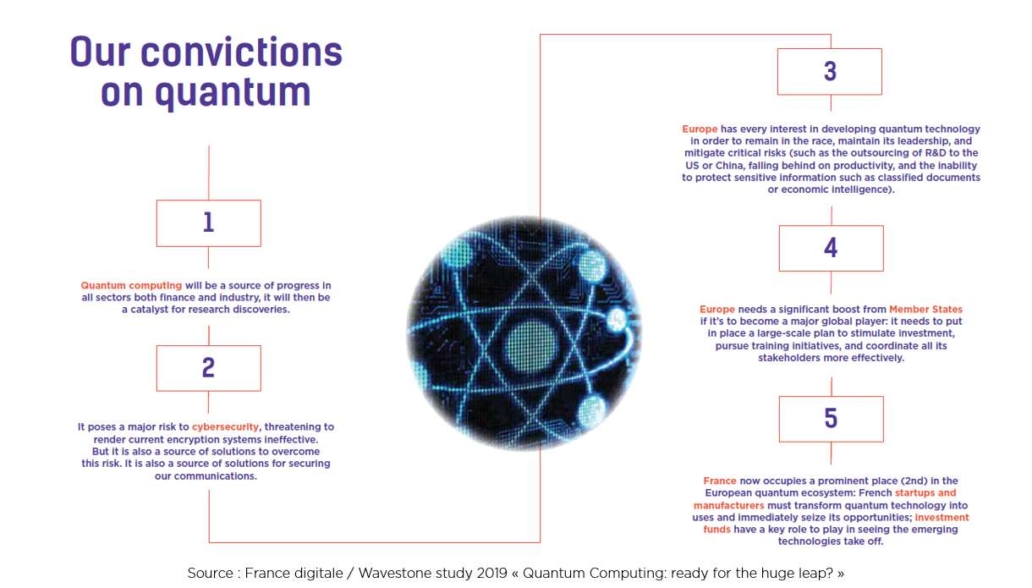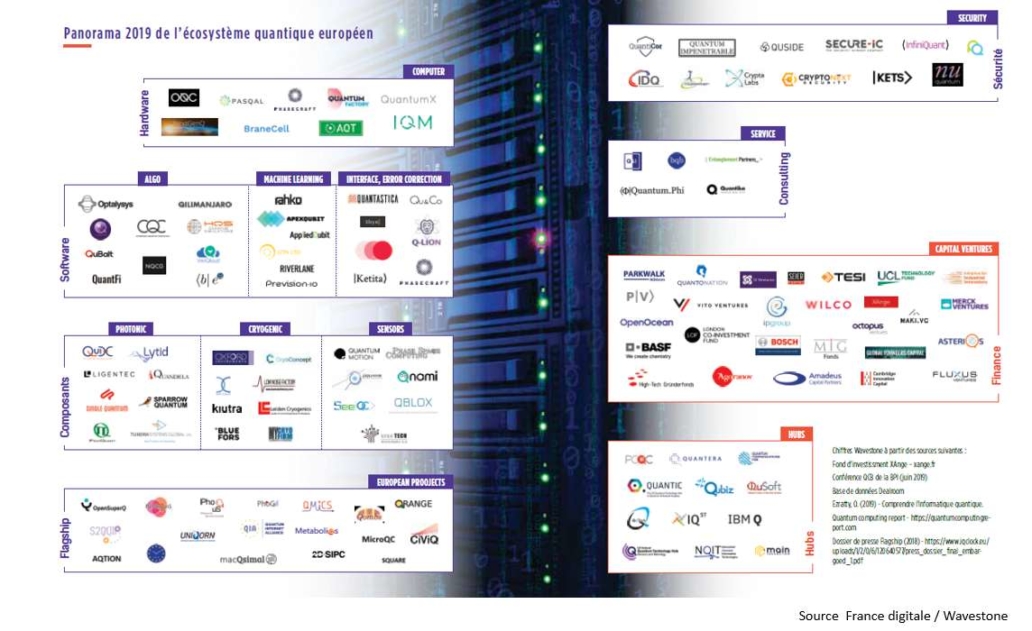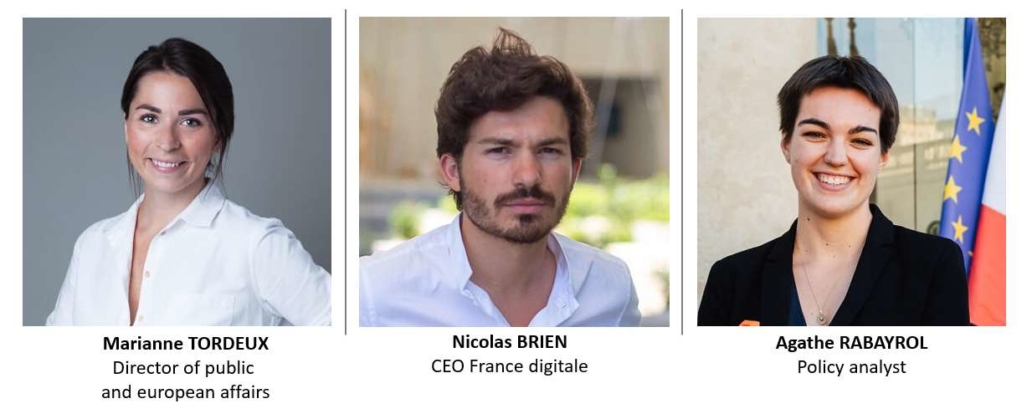A France digitale / Wavestone study 2019
2015 saw “big data”, 2016 was flooded with mentions of “artificial intelligence”, and in 2017 everybody was talking about “blockchain.” Yet of all these tech waves, quantum computing might just prove to be the most powerful. At present, this breakthrough technology remains a relative unknown, concentrated in the hands of several big tech players, despite its apparently massive potential for application.
To better understand the coming revolution, and help you prepare for it effectively, France Digitale and Wavestone have worked together to produce a study to shed light on the issues, quantum’s current and projected uses, its ecosystem, and the actions you need to take. Faced with the progress of American and Chinese giants, Europe needs a comprehensive “quantum strategy” to engage research institutes, scaleups, large groups, investors, and public authorities.

Nicolas Brien
CEO France Digitale
Quantum computing is too important a subject to be left just to engineers. It’s time the life forces of the digital ecosystem
seized it. We hope this work will provide the foundations of a common framework.
An ecosystem that is rich but still young
Like most recent technologies, quantum computing needs a rich and diverse ecosystem: from research, through financing, to marketing—all players need to be active to bring about operational solutions that will have an overall impact.
Research institutes as key partners
As the technology is still in its R&D phase, institutes and universities are key players in the quantum ecosystem. The majority of them collaborate with other research units or private companies.
At European level, many research projects involving international collaboration are in progress, such as the OpenSuperQ project which brings together collaborators from Germany, Spain, Sweden, Switzerland, and Finland. Collaboration between institutions from at least three countries is also a condition for accessing funding from the European Quantum
Flagship program.
Digital giants in the vanguard
Several major groups, with the US majors at the forefront, have developed in-house programs dedicated to quantum technology, in order to use it themselves, market it, or fund research programs. Chief among these are Google, Microsoft, IBM and Intel.
Chinese companies are also competing in the technology race. In 2015, the Chinese e-commerce giant, Alibaba, created the Alibaba Quantum Computing Laboratory. Its team is working on a number of quantum projects, including, since March 2018, the manufacturing of 11-qubit processors, the emulation of a cloud-based quantum computer, and the development of quantum algorithms. In 2018, another Chinese giant, the search engine, Baidu, created an institute dedicated to quantum computers.
In France, Atos is the leading French player in quantum computing development. Launched in 2016, the Atos Quantum program is the largest industrial program in Europe. In July 2018, the company released the Atos Quantum Learning Machine (QLM) emulator, the first large-scale, ready-to-use system, capable of emulating up to 41 qubits on traditional Intel processors.
Industry players: the vital catalysts
Large industrial groups also play a role in quantum’s development. Many have set up their own research teams or funded applied-quantum-research projects working with research institutes or startups. Some economic sectors, especially transport, aviation, telecommunications and energy, are more aware of quantum’s potential than others.
In 2015, Airbus commissioned a dedicated team to work within its Defence & Space Unit. The aerospace giant is collaborating with QC Ware (founded in the US in 2014), a quantum software startup. The goal is to use quantum computing for optimization, and quantum simulation to create ultra-durable materials. Volkswagen, already mentioned above, for its work on optimizing Beijing taxi routes, is working in concrete fashion on quantum’s possibilities thanks to its partnership with D-Wave.
In energy, Total is working with Atos (QLM) to, among other things, simulate and understand particle behavior, as well as optimize the logistics of industrial tools. In 2018, EDF too launched a dedicated project.
Investment funds are essential allies
To date, about 150 venture capital firms have invested in quantum startups.
However, the number of investment funds that specialize in quantum only is very low: no more than half a dozen in the world; quantum technology is seen as a risky investment because of the technology’s complexity and the lack of visible returns on offer.
Countries as strategic players—and their funding programs
Quantum computers have become a strategic issue for sovereignty and security. Many countries have put in place national R&D strategies, with levels of state funding ranging from €140m to €1bn.
Looking worldwide
The US and China are the two countries that have invested the most. In 2019, the US government passed the National Quantum Initiative Act. This $1.3bn state program aims to encourage both R&D and education in quantum technology.
The European Union
In 1999, the European Union invested €550m in the Future and Emerging
Technologies (FET) program. Following the “Quantum Manifesto” signed in May 2016 by more than 3400 players from the academy and industry, the EU translated its desire to increase its investment in quantum technology into action.
Quantum Flagship, launched in 2018, is a 10-year, European Commission project that invests €1bn to support 20 projects in its first phase, and mobilizes a European academic community of more than 5,000 researchers.
At European level, the ecosystem has about 90 players. The UK is in first
place with 20 startups, and behind are France, with 16, and Germany, with 14. A head start Europe should do everything to keep.

Benoit Darde
We already have all the cards in hand to make Europe a leader in quantum computing. So let’s take courage; let’s seize the opportunity right now, experiment and build the future “quantum” world!
This publication was made in partnership with France digitale.






